

Certainly the single most important black artist in rock and roll, Chuck Berry is arguably the most important figure, regardless of race, in rock history. The archetypal rock and roller, Chuck Berry melded blues, country, and a witty, defiant teen outlook into songs that influenced vitally every rock musician in his wake.
Chuck Berry's music influences |
|
|
|
Berry achieved a number of firsts:
The first guitarist/singer to reach charts.
The first rock and roller to write words that were relevant and entertaining to his young white audience with out alienating his core black audience.
First songwriter/performer in 1955.
He achieved all of this with a driving rock and
roll rhythm that was, if not brand new certainly unique enough to
be instantly recognizable. For those reasons he more than any
other artist, is responsible for the direction of popular music.
When performing his material Berry made sure to enunciate
clearly, singing outside the standard blues realm, and he
improvised lyrics that caused to audience to pay closer
attention.
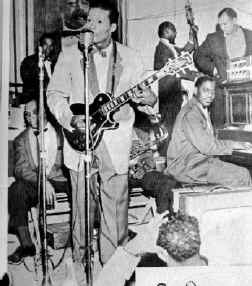
"If you tried to give rock and roll another name, you
might call it Chuck Berry"
John Lennon
|
|
|
|
Chuck Berry was born October 18, 1926 in St. Louis, Missouri. His mother, Martha, was a schoolteacher; his father, Henry, was a contractor and deacon of the nearby Antioch Baptist Church. The third of six children, he grew up in The Ville, an area just north of downtown St. Louis which was one of the few areas in the city where Blacks could own property. Consequently, during the 1920's and 30's, The Ville became synonymous with Black prosperity.
|
|
Chuck sang in his St. Louis church's Baptist choir at age six. He learned to play the guitar while attending Sumner High School, the first Black high school west of the Mississippi. Local jazz guitarist Ira Harris was an early teacher, Berry learned the rudiments of the instrument on a four-string tenor guitar. By 1950, however, he had changed over to a six-string electric
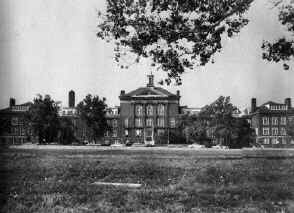
At Sumner, Berry got his first taste of stardom, singing Jay McShann's "Confessin' the Blues" in the All Men's Review in 1941; it was a song he was later to record on the 1960 album Rockin' at the Hops. But music was not his only focus at that time. When not working with his father, Berry began to cultivate a lifelong interest in photography through his uncle Harry Davis.
Before graduating from high school Berry had a number of run ins with the law. In 1944, on a joy ride to Kansas City, Berry and two friends were arrested and found guilty of armed robbery; each was sentenced to 10 years in the Intermediate Reformatory for Young Men at Algoa, near Jefferson, Missouri. While there Berry joined a gospel group and boxed briefly before being released on his 21st birthday in 1947. Chuck Berry experienced several other legal problems during his life including the crime of violating the Mann Act in 1962. He served 20 months in prison for transporting an under age female across state lines for immoral purposes, or what today is considered sex trafficking.
|
|
|
A year later, Berry married Themetta Suggs and began a series of jobs: between 1948 and 1955, Berry worked as a janitor at the Fisher Body auto assembly plant, trained to be a hairdresser at the Poro School, freelanced as a photographer, assisted his father as a carpenter, and began his career as a musician. During this time he was playing the guitar and developing a reputation around St. Louis.
|
|
In 1952 Chuck Berry began to play professionally at different clubs in St. Louis. On New Year's Eve Berry joined the Sir John Trio. The leader of the group was Johnnie Johnson and the third person was the drummer Ebby Hardy. The Sir John Trio became the house band at the Cosmopolitan Club in East St. Louis and would be the start of Berry's long association with Johnson whose piano boogie riffs would have a great influence on his guitar playing.
Johnnie Johnson was inducted into the Rock and Roll Hall of Fame in 2001
The most popular music in the area among whites was hillbilly. The band played mostly blues and ballads, but Berry"s joking "hillbilly" songs were the real pleasers and it wasn't long before a white crowd got word of a black hillbilly and began coming to his shows
"Curiosity provoked me to lay a lot of
our country stuff on our predominantly black audience and some of
our black audience began whispering "who is that black
hillbilly at the Cosmo?" After they laughed at me a few
times they began requesting the hillbilly stuff and enjoyed
dancing to it."
Chuck Berry, from "Chuck Berry: The Autobiography"
While attending a nightclub in Chicago in 1955, Berry met his
idol Muddy Waters and asked Waters where he might be able to cut
a record. Waters directed him to Leonard Chess of Chess Records
In May, 1955, with an introduction from Waters, Berry went to
Chicago to audition for Leonard Chess in hopes of landing a
recording contract. Berry thought his blues material would
be of most interest to Chess, but to his surprise it was the
hillbilly "Ida Red" that got Chess' attention. Chess, a
great blues label, in recent years had seen its market shrink and
was looking to move beyond the rhythm and blues market and Chess
thought Berry might be that artist that could do it. So on May
21, 1955 Berry recorded, "Ida Red" renamed
"Maybellene," the name taken from a line of cosmetics,
with Johnny Johnson, Jerome Green (from Bo Diddley's band) on the
maracas, Jasper Thomas on the drums and blue legend Willie Dixon
on the bass. Johnson's piano playing, the heavy drums and maracas
and Berry's lead style gave Maybellene the hard rhythm and blues
feel that balanced the country elements. Maybellene reached the
pop charts and #1 on the rhythm and blues charts.
To help get airplay Chess gave a copy of the record to the influential disc jockey Alan Freed.. In return Freed and his associate Russ Fratto were given two-thirds of the writing credits, something that Berry was unaware of until the song was released and published. Freed aired the single for two hours on WINS in New York. The song went on to sell over a million copies, reaching #1 on Billboard's R & B chart and #5 on the Hot 100.
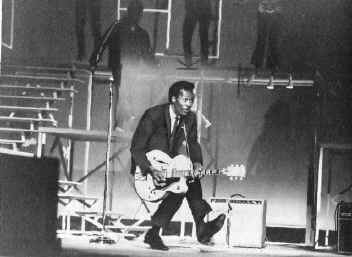
Berry excelled on the stage, especially after his signature "duck walk"was introduced into his act in New York in 1956. Berry says he perfected his famous duck walk to hide the wrinkles in a rayon suit at a1956 performance in New York, "It got an ovation," he recalls, "so I did it again and again."
With nearly twenty chart hits between 1957 and 1960, Berry became famous for his examination of the adolescent experience, particularly on "Rock 'n' Roll Music", "School Day" and "Sweet Little Sixteen". He even made several big-screen appearances - "Rock Rock Rock", "Mr. Rock'n'Roll" (both 1957) and "Go Johnny Go" (1959), while his live concert show was captured on film in "Jazz On A Summer's Day" (1960)
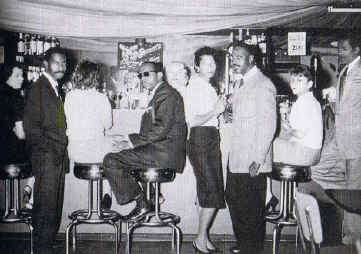
Club Bandstand 1959
With the money from all this success, he purchased some 30 acres of land in Wentzville MO (about 30 miles west of St. Louis) in April 1957, and 11 months later, he opened Club Bandstand. The Club was located at 814 North Grand Avenue between Delmar and Enright; in the 1910's and 1920's, this was St. Louis' Theater District, home to the Princess Theater, the St. Louis Theater and the segregated Fox. The area was also a bastion of white professional culture. Not only did fraternal organizations such as the Masons and the Scottish Rite build their temples there, but the area was home to a number of doctor and dentist offices and the gradually expanding St. Louis University. The appearance of a racially integrated nightclub owned by a successful black entertainer in such an area must have been a red flag to the local authorities, and it wasn't long before the St. Louis police had their chance to close it down, engendering the scandal that very nearly put an end to Berry's career.
|
|
In December 1959 following an appearance in El Paso, Berry and
his band visited nearby Juarez, Mexico. There he invited a
fourteen year old Apache waitress Janice Escalanti from
Yuma, Arizona, to work as a hat check girl at his nightclub
Berry's Club Bandstand in St. Louis. According to Berry,
when he refused her advances she left in a fit of anger. On
December 21 Escalanti arrest on a prostitution charge at a local
hotel. This incident would lead to Berry being charged with
violation of the Mann Act.. This federal statue forbid the
transporting a minor across state lines for the purpose of
prostitution. Berry was convicted to five years in prison
and fined $5,000. An appeal was made based on racial comments
made by the presiding judge and a new trial began in October,
1961. Most of the original verdict was upheld and Berry received
three years at the Indiana Federal Prison and fined $10,000. Two
months later he was transferred to Leavenworth Federal Prison in
Kansas. He completed his sentence at the Federal Medical Center
in Springfield, Missouri and was released on his birthday October
18, 1963. Chuck Berry was never the same again. He felt he had
been hounded by the press and betrayed by the both sides of the
legal professional.
Upon has release he resumed recording and touring. From February,
1964 to March 1965, Chess released six singles, all of which made
the top 100. "Nadine", "No Particular Place To
Go", "You Never Can Tell', and "Promised
Land", were all written in the Federal Medical Center in
Springfield, MO, and rank among the very best songs in the Berry
catalog. Sadly, the last of these singles, "Dear Dad",
was to be Berry's last chart success for seven years, heralding
another decline in his career.
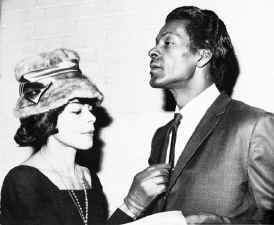
With Themetta in London 1964
In 1964 Berry toured Great Britain for the first time and
recorded an album with guitar great Bo Diddley, Two Great
Guitars. He also opened the amusement park Berry Park, near
Wentzville, Missouri in the early sixties.
Berry left Chess in 1966 for Mercury Records. His Mercury albums,
including Live at the Fillmore, recorded with the Steve
Miller Blues Band failed to sell, and he returned to Chess in
1970. The Chess albums Back Home, San Francisco Dues and
Bio are considered among his finest.
In the late sixties and early seventies Berry was a fixture at
"Rock Revival" shows. It was at one of these shows that
unknown to him "My Ding-A-Ling"was recorded. It's
ironic that this silly, smutty sing along would be Berry's
only number one record. Originally recorded under the title
"My Tambourine" on the 1968 Mercury album From St.
Louis to Frisco, it became Berry's best-selling single ever
in July of 1972. The song was wholly owned by Berry's
publishing company, Isalee, providing him the kind of financial
reward that far better works never did.
Chuck Berry appeared in the 1973 film Let the Good Times
Roll, compiled from Richard Nader's rock 'n' roll revival
shows, and in 1978 film American Hot Wax, a fictional
week in the life of rock 'n' roll, with disc jockey Alan Freed as
its central character. Berry also toured regularly and appeared
on numerous television shows during the 70s. He reemerged with a
new round of touring and his first album of new material in
years, Rock It.
|
|
Since the release of Rock It, Berry's career has been marked by even more controversy. A four month jail term in 1979 for tax evasion, and a lengthy round of litigation in the early 1990's by a number of women who accused Berry of videotaping them as they went to the bathroom at Berry Park and Berry's Wentzville restaurant, The Southern Air, coupled with numerous erratic live performances, have added fuel to Berry's reputation of being difficult and unpredictable.
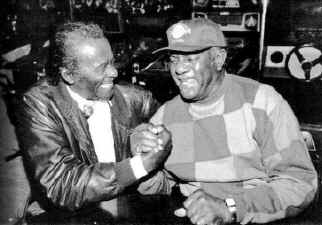
Berry and Johnson 1985
Berry's contribution to rock and roll is enormous and still being felt, as his 1986 induction to the Rock and Roll Hall of Fame and 1987 release his totally self-written autobiography and the following year Hail! Hail! Rock ' n' Roll have proved.
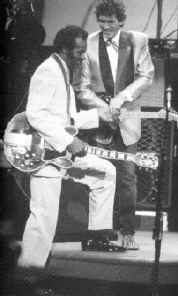
Berry and Keith Richards "Hail!
Hail! Rock 'n" Roll
Hail! Hail! Rock 'n' Roll was filmed and recorded at a 1986 concert in St. Louis organized by Keith Richards to celebrate Berry's sixtieth birthday and featuring Richards and Eric Clapton. In 1993 Berry performed at President Bill Clinton's inaugural.
Unfortunately, Berry didn't think that his records had any longevity, and he treated them like perishable products. It was only a matter of time before he dropped his band (allegedly because of excessive drinking) and started playing with local pick up bands. His standard procedure was to have the local promoter make all the arrangements, with different players in every town to avoid the expense of travelling with a steady band. More often then not, he would show up at a club or concert hall minutes before show time, get paid, then meet the band if time allowed. If not he go out on stage, tune his guitar and then tell the band to watch his leg for clues. The shows were usually disappointing to his fans, and he has since developed a reputation for being more concerned with saving a buck or two then pleasing his audience
Berry was a moody man who burned many bridges in his life and was never nice to those he did not know well. It should be remembered that Berry was a victim of prejudices of the time, songwriting credits were stolen from him ( Freed and a Freed associate Russ Fratto were listed as a co-writers on Maybellene) and was harassed by the government.
However, in the 1950s he led the way in uniting the white and black races when it came to music. Berry had a unique talent of being able to put his thoughts into song form. While most of his songs dealt with teenage life, Berry also covered a wide range of universal subjects: love, money, fame, glory, loneliness and rejection.
On March 18, 2017, Berry was found unresponsive
at his home near Wentzville, Missouri. Emergency workers called
to the scene were unable to revive him, and he was pronounced
dead of cardiac arrest by his personal physician.
Berry was inducted into the Rock and Roll
Hall of Fame in 1986.
Berry was inducted into the Blues Foundation' Hall of Fame in
1985.
Chuck Berry: Rock
and Roll Poet
![]()